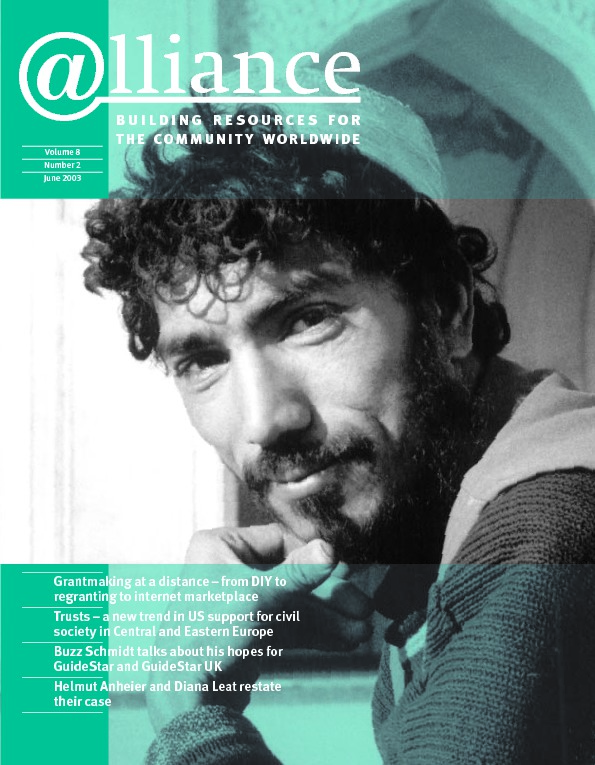Many contributors to this issue of Alliance have stressed the need for the Millennium Development Goals (MDGs) to be translated into local terms; others have spoken of the need for the business sector to be involved in implementation. In Brazil, the Ethos Institute is trying to do both of these things. It has related each of the Goals, including targets and indicators, to an existing set of indicators developed by Ethos for the Brazilian business community and to a set of business initiatives already under way in Brazil.
The Ethos Institute report, Business Commitment to the Millennium Goals, correlates each of the eight MDGs with the Ethos Social Responsibility Indicators, of which there are 33, grouped around seven themes. These indicators are in sync with both the Global Compact principles and the MDGs. The aim, according to the report, is ‘to get a picture of the countless business experiences that are contributing to the fulfilment of the Millennium Goals in Brazil as well as a precise view of the range of possible actions companies could be conducting’. This demonstrates the ‘diverse possibilities for companies in terms of incorporating them [the MDGs] into their own goals and into how they choose to manage their businesses’.
In relation to Goal 1, for example, support for employment and income generation is identified as a key area of activity; support for school meals is another. Others are actions to combat hunger in rural areas and in urban areas, dietary education programmes, and programmes to include groups that suffer from discrimination. In each case, the report gives examples of companies that are already active in these areas.
This initiative is part of a wider National Movement for Citizenship and Solidarity (NMCS), organized in 2004 with the aim of mobilizing all sectors of society – government, business and civil society. In February last year, at a meeting with President Lula, Oded Grajew, President of the Ethos Institute, put forward the idea of a national day of solidarity each August. Grajew then convened a meeting with representatives of business, trade unions, civil society and UNDP, representing the UN agencies in Brazil, to discuss the idea further. This group concluded that, for Brazil, solidarity and citizenship mean achieving the MDGs. So the link was made and the proposed day became a week, around 9 August in honour of Herbert de Souza, ‘Betinho’, a well-known Brazilian civil society leader, who died on that day.
The next step was to involve Brazil’s 15 national councils, half government, half civil society in composition, each of which works on a specific area such as education, health, environment, children and women. Until last year, each council worked on its own. Now the NMCS has invited the councils to come together and join in its deliberations about establishing specific Brazilian Goals.
Another of NMCS’s achievements is a commitment by government to report annually on what it is doing to achieve the Goals. The first of these was published in October 2004 and the second will appear this September.
Raising public awareness
A national advertising campaign, created on a pro bono basis by PR firm McCann Erickson, has started to raise public awareness about the MDGs and foster public discussion about how all citizens can contribute to creating a fairer society and better conditions of life for all Brazilians. The annual National Citizenship and Solidarity Week will provide a focal point for the campaign and will also involve public recognition of exemplary actions by municipalities, social organizations, business and citizens to achieve the MDGs.
During the second of these weeks, taking place this August, the campaign is launching another publication, highlighting the work of companies in respect of the Goals since last year. A national prize, recognizing achievements by local governments, state governments, business and civil society in meeting the Goals, is also being launched. The Week will be national in scope, but there will be an official opening ceremony in the state of Minas Gerais, with the president, government representatives, the governor, and representatives of civil society and business.
Throughout the Ethos Institute has played a coordinating role and its influence with the business community has been important in mustering their support. The Institute has some 1,050 member companies representing more or less 35 per cent of Brazilian GDP, many of whom are supporting the campaign for the MDGs.
For more information about the Ethos Institute, contact Cristina Spera at cspera@ethos.org.br or visit http://www.ethos.org.br
For more information about the Brazilian national campaign, visit http://www.nospodemos.org.br and http://www.pnud.org.br/odm






Comments (0)